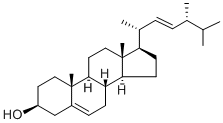Uses
Brassicasterol was used as standard to analyze the sterols from mussels sample by thin layer chromatography.
Uses
A phytosterol found in canola oil, rapeseed oil, marine algae and shellfish. This compound has been shown to inhibit sterol Δ24-reductase, an enzyme involved in the mammalian cholesterol biosynthesis pathway.
Definition
ChEBI: Brassicasterol is an 3beta-sterol that is (22E)-ergosta-5,22-diene substituted by a hydroxy group at position 3beta. It is a phytosterol found in marine algae, fish, and rapeseed oil. It has a role as an EC 1.3.1.72 (Delta(24)-sterol reductase) inhibitor, a biomarker, a human metabolite, a plant metabolite, an animal metabolite, an algal metabolite, a sterol biosynthesis inhibitor and a marine metabolite. It is an ergostanoid, a 3beta-sterol, a member of phytosterols and a 3beta-hydroxy-Delta(5)-steroid.
General Description
Brassicasterol is a plant sterol, sharing similar structure with cholesterol. It is obtained through the dietary sources, including sea food.
Biochem/physiol Actions
Brassicasterol is a plant sterol, structurally similar to cholesterol. Plant sterols compete with cholesterol and reduce the content of cholesterol incorporated into micelles thereby reducing its absorption. Brassicasterol reportedly decreases the progression of atherosclerosis. The level of brassicasterol in cerebrospinal fluid may be used as a prognostic factor for progression of Alzheimer′s disease.
Side effects
Plant sterols are LIKELY SAFE for most people when taken by mouth. They can cause some side effects, such as diarrhea or fat in the stool.
Precautions
Sitosterolemia, a rare inherited fat storage disease: Plant sterols can build up in the blood and tissue of people with this condition. This build-up can make these people prone to early heart disease. Taking plant sterols might make this condition worse. Don't take plant sterols if you have sitosterolemia.
Short bowel syndrome, a condition related to removal of part of the gut: Worsening of liver function has been reported for a person with short bowel syndrome who was given nutrients containing plant sterols. Liver function improved when the plant sterols were removed from the nutrients. It's not clear if the plant sterols were responsible. Until more is known, don't take plant sterols if you have short bowel syndrome.


